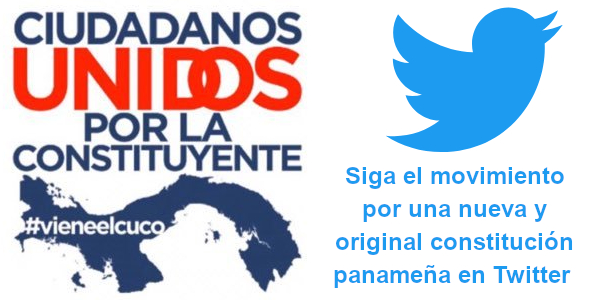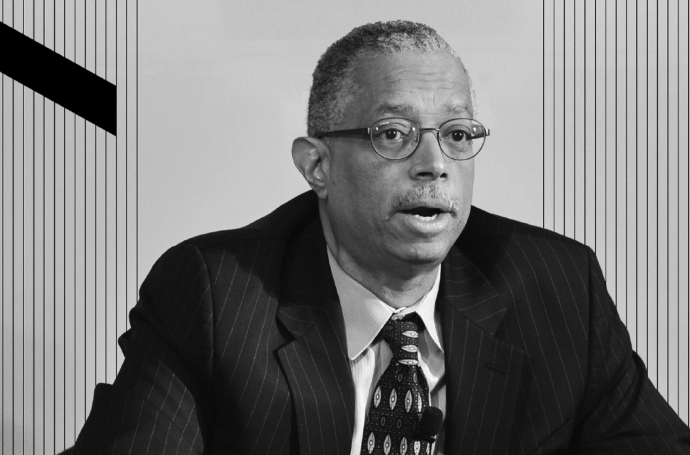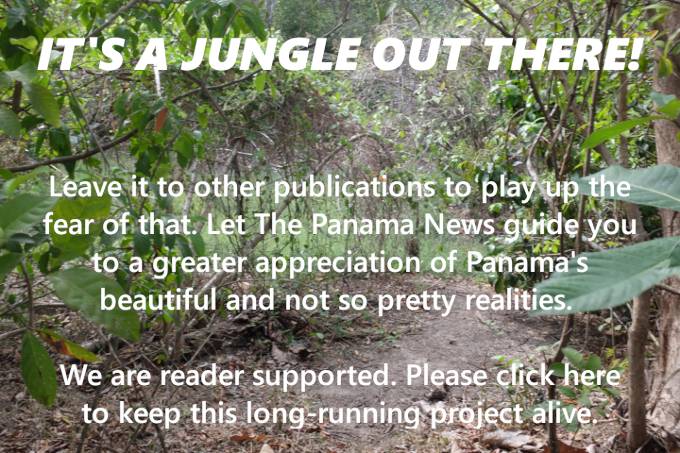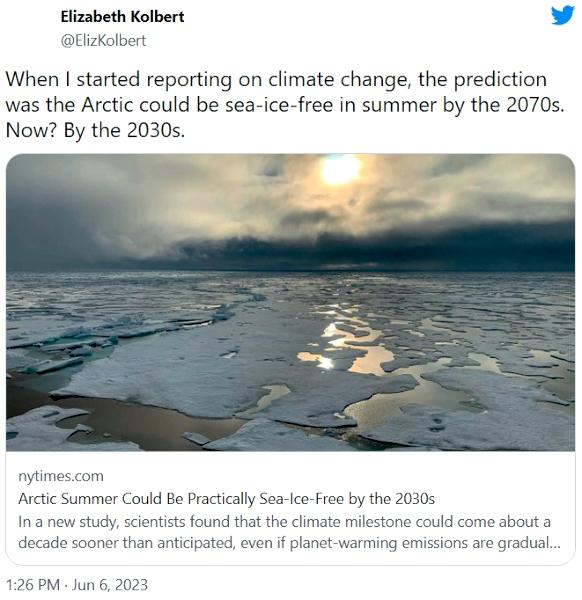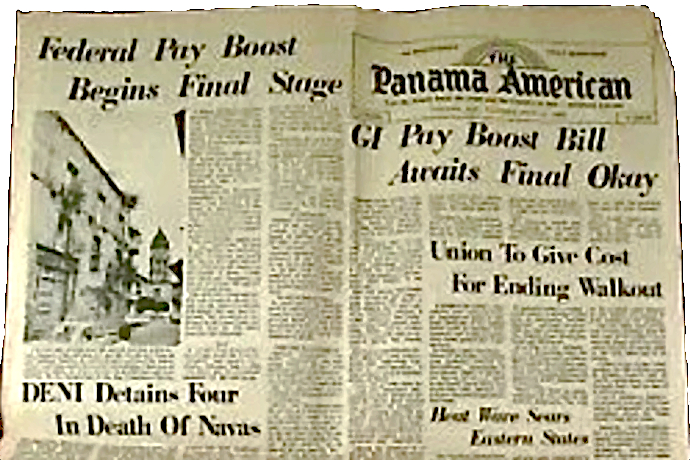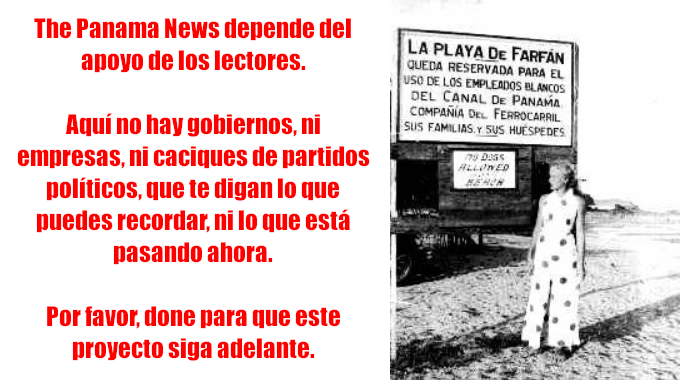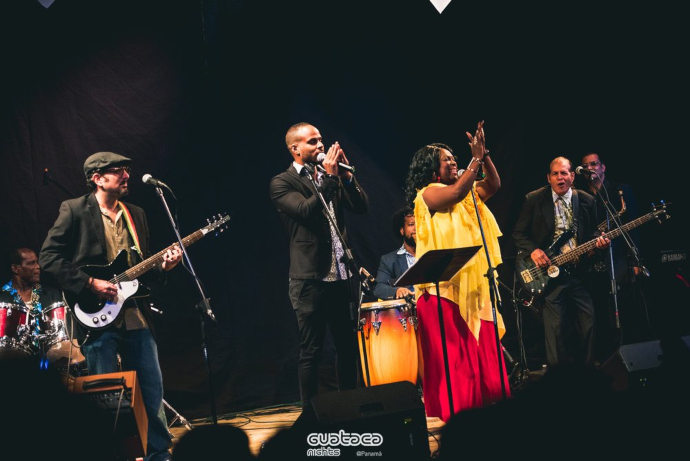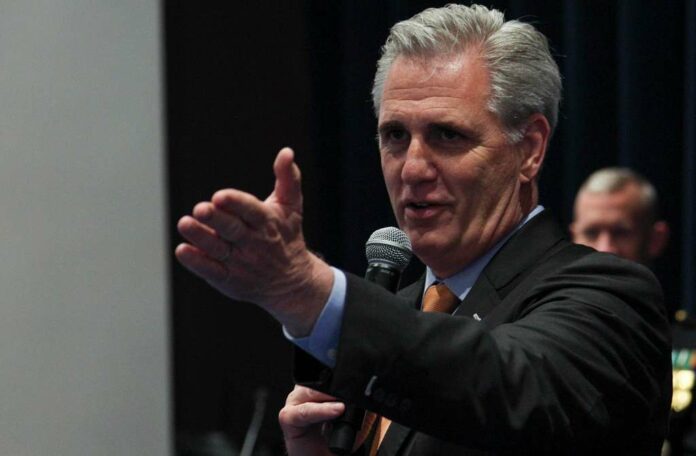Santa Teresa de Jesús, retratada en la iglesia de El Carmen de Ciudad de Panamá. Qué santos se representan, cómo se cuentan sus historias, sus razas y otros atributos físicos: este simbolismo también tiende a reflejar cómo se imaginan a sí mismas las élites. Foto de Wikimedia por Abraham Menahemm.
Pensar la historia a partir de un ensayo de Alfredo Castillero C.
por Olmedo Beluche
Personalmente confieso que no solo lo leí con el interés con el que sigo todo lo que escribe Castillero, sino que este ensayo me ha hecho reflexionar. De esa reflexión puedo afirmar que suscribiría la mayor parte de lo dicho en “Pensar la historia: Propuestas epistemológicas”, por Castillero. Pero no todo. Ahí está justamente el debate académico del que seguramente se podrá sacar más jugo del aporte que nos ha regalado el maestro Castillero.
¿Qué dice Alfredo Castillero?
De salida afirma: “Los hechos históricos no se comportan linealmente, ni son el resultado de procesos que tienen un solo origen”. Los hechos históricos son de “causalidad múltiple”. Define la historia como “un proceso de cambios”, en los que algunos tardan siglos en madurar y otros irrumpen de manera no prevista, de allí lo “imponderable” de la historia. “Ni un principio anticipa el fin, ni siempre es fácil reconocer el origen de lo que vino después”.
Luego desliza una crítica al marxismo (o a cierto marxismo mecanicista). “No se puede reducir el estudio del pasado solo a conflictos de clase, ni a todo fenómeno subyace una razón económica, porque la historia no es tan simple, ni está hecha de categorías abstractas, sino de individuos concretos…”.
Castillero rescata el peso en los hechos de la historia de factores subjetivos como el poder, la codicia o las mentalidades. “… no siempre lo que decide es lo económico. Muchas veces el gran motor de cambio son los sueños, las mentalidades, los mitos e ilusiones de los pueblos”.
Respecto a la relación entre lo económico y la cultura (o ideología), Castillero dice: “El materialismo histórico nos ha acostumbrado a pensar que el estudio del primero debe explicar el segundo…”. Al respecto, más adelante pone el ejemplo del período colonial, en el que las motivaciones de las personas estaban más en lo espiritual que en lo económico.
Si bien esto puede ser aplicable a algunos autores, no es el caso de la mayoría de los historiadores (as) marxistas de muy alta calidad y que, con seguridad él conoce. Para mencionar algunos, citemos a los reputados marxistas británicos: Maurice Dobb, Rodney Hilton, Christopher Hill, Eric J. Hobsbawm y Edward P. Thompson.
En realidad lo que el marxismo señala es que existe una relación entre la organización social, no solo económica, con las formas de pensar de una época, con la cultura “inmaterial”. No un “determinismo económico”.
Respecto a la relación economía y cultura (superestructura) saca una conclusión importante: “Pero también esos dos polos -el de lo material y el del espíritu- pueden incitarse mutuamente en una inagotable relación dialéctica en la que a veces no se sabe dónde encontrar el origen de sus ritmos, discernir el predominio de una fuerza sobre otra”. Pues esto justamente es lo que plantea el método marxista, la relación “dialéctica” entre organización social (no solo economía) y cultura.
Advierte que, para hacer historia científica, hay que evitar hacerlo en base a criterios ideológicos, partidistas, familiares o provincianos. Estos vicios conducen a una historia sin base documental la cual termina en mito. “La materia prima de la historia es el pasado, y al pasado nos asomamos con evidencias documentales, no mediante abstracciones… basadas en elucubraciones teóricas…”.
Respecto a los enfoques cuantitativos vs cualitativos, Castillero advierte, hablando del primer método contra el “falso rigor” de la cita documental y del análisis estadístico, porque a veces el documento o el “dato” (agregamos) no lo dice todo, porque “… la labor del historiador es hacer hablar los textos donde estos callan, no someterse servilmente a su estricta literalidad”. Y sobre los enfoques cualitativos hay que cuidarse de la especulación sin evidencias.
Destaca la importancia de los objetos para comprender la cultura de cada época porque permite convertir la “anécdota en historia densa”, y cita al norteamericano Clifford Geertz, padre de la antropología simbólica, como referente en este tema.
Posteriormente, Castillero analiza la importancia de las crisis históricas porque en ellas la sociedad expresa claramente sus angustias, miedos y odios. En las crisis sobreviene un “aluvión de testimonios” de diverso tipo, que hace que los hechos resplandezcan “como relámpago en la noche oscura y muestran, de golpe, un horizonte que ni siquiera sospechábamos”. Volviendo a las cuestiones de método señala que el historiador debe partir por un conjunto de preguntas, y cita a Lucien Febvre: “Formular un problema es el comienzo y el fin de toda la historia. Sin problemas no hay historia”.
También aborda el problema de la historia tradicional afirmando: “La mayoría de los panameños comparte una visión del pasado dominada por lugares comunes, falsificaciones, ambigüedades, omisiones y mitos. A esa visión subyace una concepción epistemológica de la historia profundamente tradicionalista y conservadora. Tradicionalista porque prefiere la anécdota al análisis y confunde la historia con meras cronologías… Conservadora, porque le incomoda la posibilidad de enfoques revisionistas que pudieran cuestionar los hitos sobre los que descansan los valores de una alegada identidad nacional en la que no hay sombras ni manchas de dudas”. Coincido plenamente.
Criticando esos enfoques tradicionalistas opina Castillero, que creen que hacer historia consiste solo en narrar hechos, cuando en realidad “cada dato debe ser interpretado y toda historia debe ser explicada” (tomar nota). “Sin embargo, no debemos olvidar que no hay historia sin hechos… sin pruebas”.
Aunque señala que se puede hacer historia de múltiples maneras, dependiendo de los criterios de cada historiador (a), todas legítimas, siempre que se atengan a los hechos, y que incluso la microhistoria aporta luces, Castillero termina abogando por la “historia total”: “… debemos intentar en la medida de las posibilidades documentales, reconstruir la mayor cantidad de espacios de pasado para observarlos como conjunto armónico y coherente…”.
El último subtítulo lo denomina “Memoria, historia e identidad”, y empieza citando a Fernand Braudel cuando dice que: “El tiempo pasado no es nunca totalmente pasado, y algunas veces el presente está más cerca del pasado que del porvenir”.
Para culminar en la parte más controversial de este ensayo, a mi modo de ver, cuando afirma que a veces la realidad histórica nos empuja a un destino que no podemos controlar. Hablando de Panamá: “Después de todo, nuestra posición geográfica jalonó nuestra historia desde el comienzo y la sigue jalonando”. “La identidad de los pueblos se sustenta sobre la conciencia de su pasado. Mientras más fuerte es esa identidad más sólida es su sentido de historicidad, de pertenencia a un pasado común”.
“Nuestro nacionalismo, al igual que le nacimiento del liberalismo, …, se originó en el siglo XIX… Pero si el nacionalismo y el trasfondo ideológico que le sirve de base, han constituido los soportes fundamentales de nuestra legitimación como pueblo y como unidad nacional, es necesario que esa legitimación tenga apoyo en la conciencia histórica” (ojo).
Esto último me recuerda un mandato de Carlos Gasteazoro para los historiadores panameños en el sentido de que debían buscar en el pasado colonial y del siglo XIX las particularidades que nos diferenciaran de Colombia, ya que los historiadores panameños de aquella época no lo hicieron (Gasteazoro, 1970). Poner lo que no estaba, pero que sirva a la legitimación del estado nación nacido el 3 de noviembre de 1903.
Reflexiones críticas a los aportes epistemológicos de Castillero
A. No discuto aquello con lo que estoy plenamente de acuerdo: la historia es un libro abierto y, en buena medida imponderable, porque los factores que intervienen en ella son tantos que es muy difícil predecirla; factores objetivos y subjetivos; y no puede ser reducida a un solo factor, así sea el económico como hace cierto marxismo mecanicista. Por eso, ni el tirano más poderoso puede controlar por completo una sociedad, ni el historiador más sagaz es capaz de predecir el futuro con certeza.
B. La historia es un libro abierto, pero es posible encontrar en ella tendencias, regularidades y, de hecho, se pueden hacer, y se hacen, pronósticos de tipo probabilísticos o hipotético-deductivos. Si no fuera así, la “historia científica” de la que habla Castillero no sería posible porque tendríamos un caos en el que solo quedaría aplicar un “individualismo metodológico”, es decir, meras descripciones anecdóticas de las que no se podrían sacar conclusiones.
C. La historia, para que sea ciencia, como desea Castillero, busca en el mar de hechos que parecen caóticos, establecer algún orden lógico, racional. Y con qué instrumentos vamos a los hechos (documentos, registros o datos) a encontrar el orden racional de las cosas: vamos armados con un instrumental teórico, con categorías (como diría Kant), con conceptos teóricos con los que cotejamos los hechos y los ordenamos.
D. Es ahí donde hay que recatar, entre tantos aportes teóricos en historia y ciencias sociales el materialismo histórico, que Castillero parece rechazar en bloque, porque ha aportado un aparato conceptual que permite poner luz, o ayudar a comprender muchos hechos históricos y sociales.
E. Castillero cita a Fernand Braudel, de cuya corriente abrevó en sus ensayos de juventud, por lo que sabe muy bien que la “escuela de los anales” en general, y la historia económica debe muchísimo a la teoría marxista o materialismo histórico. Porque, después de todo, el concepto “larga duración” tiene una deuda con la categoría marxista de “modo de producción”.
F. Otro ejemplo, entre muchísimo, en los que el marxismo ha puesto luz: ¿A qué se debió la Segunda Guerra Mundial? ¿A la “locura” de Hitler como pretende cierta perspectiva ideológica norteamericana? ¿O fue un conflicto entre intereses capitalistas por el control de los mercados mundiales? ¿A qué se debe la guerra ruso-ucraniana, a la ambición desquiciada de Putin, como dicen algunos medios de comunicación, o hay algo más profundo respecto al control planetario por parte de potencias imperialistas? El método marxista ayuda a responder estas preguntas con mucho rigor científico y factual, superando las interpretaciones sicológicas y caricaturescas de claro corte ideológico.
G. Por otro lado, Castillero no puede dejar de reconocer que, en la relación entre potencias imperialistas y sociedades coloniales y semicoloniales, la variante marxista latinoamericana denominada Teoría de la Dependencia ha aportado considerablemente.
H. El método marxista también ayuda a comprender la historia de Panamá: ¿En la separación de Colombia jugaron algún factor intereses capitalistas materializados en la Compañía Nueva del Canal, la Panamá RailRoad Co., J. P. Morgan y el abogado William N. Cromwell? ¿O todo se reduce al “fervor patriótico” de J. A. Arango y Manuel Amador Guerrero? ¿Por cierto, estos últimos personajes guardaban alguna relación con los primeros? De nuevo, solo un método que diseccione los profundos nexos entre intereses económicos foráneos y locales puede ayudarnos a conocer las motivaciones reales de los actores de la separación de Colombia, superando el cúmulo de falsedades y medias verdades que rodean el acontecimiento en la historia oficial panameña.
I. Si bien, como dice Castillero, no todos los hechos históricos son reducibles a razones económicas o clasistas, buena parte de esos hechos sociales e históricos sólo se entienden gracias al instrumental teórico aportado por la teoría marxista. Podríamos seguir ejemplificando el enorme poder del materialismo histórico para entender las sociedades, por ejemplo: ¿Las próximas elecciones de 2024 en Panamá son una competencia democrática entre proyectos, como dicen algunos políticos, o hay inconfesables intereses crematísticos detrás de la mayoría de los partidos y sus candidatos?
J. Por supuesto, lo material o económico no lo explica todo, pero muchas veces, sobre todo en los trazos gruesos de la historia, es posible establecer una relación entre el “mundo material” y el “mundo espiritual”. Por eso coincido plenamente por lo dicho por Alfredo Castillero Calvo cuando afirma: “Pero también esos dos polos -el de lo material y el del espíritu- pueden incitarse mutuamente en una inagotable relación dialéctica en la que a veces no se sabe dónde encontrar el origen de sus ritmos, discernir el predominio de una fuerza sobre otra”. Exactamente ese es el criterio del marxismo no mecanicista.
K. Nos ilustró en ese sentido una clase con el profesor Guillermo Castro en la Maestría de Estudios Políticos de la Universidad de Panamá, señalando la relación entre las corrientes pictóricas mexicanas y la historia política del país. Mientras en el período colonial prevalecían pinturas con temas religiosos y personajes notables del Virreinato de la Nueva España; durante el “Porfiriato” destacaban los retratos de burgueses y de paisajes en que aparecían las nuevas tecnologías, como el ferrocarril; la pintura muralista nació con la Revolución de 1910, llenándose sus temas de los actores centrales de aquella gesta: campesinos, indígenas, pueblo. Podríamos aportar muchísimos otros ejemplos como éste, en el que el enfoque marxista aporta enormemente a la comprensión de los hechos históricos.
L. Fue el filósofo Hegel el que se preguntó si la historia humana obedecía a alguna lógica, si se movía en algún sentido, o si era solo repetición infinita, como creían algunas culturas, o su objetivo era la segunda venida de Jesucristo, como creía el cristianismo. De esa reflexión nació la “filosofía de la historia”, pero, como Hegel era idealista y metafísico, dijo que la historia era el desarrollo de la Idea Absoluta que se había alienado de sí misma, y que debía reencontrarse como conciencia humana en la sociedad moderna europea. Hizo falta que llegara Carlos Marx para aportar una mejor interpretación, señalando que la historia humana encuentra su sentido en la búsqueda de la sobrevivencia como especie, lo que implica satisfacer las necesidades humanas, empezando con las fisiológicas y continuando con las “espirituales”, mediante el trabajo. Y que el tono de cada sociedad en concreto se obtiene de la forma específica en que organiza el trabajo socialmente y de las variantes tecnológicas (fuerzas productivas) que el ingenio humano va creando.
M. Los historiadores postmodernos, más pesimistas e individualistas, prefieren la Tesis IX de Walter Benjamin en la que, a partir de un cuadro de Klee, “Angelus Novus”, éste define el ángel de la historia como el de ese cuadro que, empujado por el viento avanza con el rostro vuelto hacia el pasado. “Donde ante nosotros aparece una cadena de datos, él ve una única catástrofe que amontona incansablemente ruina tras ruina y se las va arrojando a los pies”.
N. En mis clases de teoría sociológica siempre digo a los estudiantes que todos los enfoques teóricos de las ciencias sociales recogen un elemento de verdad y tienen un ámbito de validez o utilidad, dependiendo de a qué asunto se apliquen. Que el problema está cuando se eleva al absoluto un solo método para todos los problemas. De manera que, cuando se analizan los grandes conflictos sociales e históricos, el materialismo histórico nos ayuda profundamente, pero no es muy útil si hacemos microsociología o microhistoria.
O. La parte más discutible del extraordinario ensayo aportado por Alfredo Castillero es la que se refiere a lo concreto, a Panamá. Porque me da la impresión de que hay una contradicción con lo expuesto al inicio, ya que parece apelar a cierto “determinismo” geográfico o histórico respecto a los habitantes del istmo de Panamá, muy característico de la historia oficial panameña.
P. Cuando afirma: “Después de todo, nuestra posición geográfica jalonó nuestra historia desde el comienzo y la sigue jalonando”, “empujándonos irreversiblemente hacia un destino que difícilmente podemos dirigir o controlar…”. Todavía se vuelve más controversial cuando en los siguientes párrafos asocia ese determinismo geográfico al “nacionalismo” e “identidad” panameña, que se originó en el siglo XIX y “maduró” en el siglo XX.
Q. Castillero fue mi profesor en uno de mis cursos de maestría y fue una buena parte de su obra histórica, combinada y cotejada con la de Ricaurte Soler, la que utilicé en mi tesis de grado (Beluche, 1997). La lectura de la historia panameña aportada por Castillero me llevó a la conclusión central de mi tesis: no existía en nuestro siglo XIX en el imaginario popular un proyecto separatista o de construcción de un estado nacional independiente de Colombia. Inclusive tampoco en la clase dominante panameña, la comercial, hubo una convicción mayoritaria en favor de ese proyecto, aunque coyunturalmente fue planteado por algunas personas. Más aún, toda esa historia de “intentos separatistas” fue una creación posterior a los hechos de 1903, en los que conflictos políticos, fueron reducidos a proclamas separatistas.
R. No existe una “nación panameña” nacida hace 500 años marcados por la geografía y el “amor” entre Balboa y Anayansi. Eso es un invento de la “nación romántica”, como dice Luis Pulido (Pulido, 2008). Por ello, tampoco es cierta la afirmación de que “los panameños nos independizamos de España solos y nos unimos voluntariamente a la Gran Colombia de Bolívar”. Las “provincias del Istmo” no eran una “nación” en 1821, por ende, nadie habló por “los panameños”, hablaron los municipios de acuerdo a la tradición española. Y hubo contradicciones sociales, económicas y culturales muy claras entre La Villa y Panamá (clases campesinas y clase comerciante). Además, las provincias del Istmo eran parte del Virreinato de la Nueva Granada desde 1839, por ende, al proclamarse las actas del 10 y del 28 de noviembre se dice con naturalidad que eran parte del estado recién creado, Colombia.
S. Asociar la identidad nacional del pueblo panameño al determinismo geográfico durante el siglo XIX conduce a otro error histórico, porque lo que caracterizó la historia social del Istmo en esa centuria fue un creciente conflicto social y político entre el pueblo del arrabal y el campesinado de Azuero contra los comerciantes y latifundistas. Liberales contra conservadores. Ese conflicto fue la tónica, desde la crisis de 1826 entre Bolívar y Santander, hasta la Guerra de los Mil Días.
T. La trampa más engañosa en la que caen historiadores y sociólogos es la del concepto “nación”, con el que se pretende borrar los conflictos sociales y de clases. En el caso panameño, un ejemplo de este error lo cometió Ricaurte Soler, quien pese a ser reputado como marxista, cuando analiza el conflicto de 1860-61, otorga supuestas virtudes nacionalistas al gobernador de Panamá, Santiago de la Guardia, y critica al arrabal de Santa Ana porque se posicionó junto a su líder, Buenaventura Correoso, del bando liberal del gobierno presidido por Mosquera (Soler, 1971) (Soler, 1963).
U. En todo caso, a lo largo del siglo XIX, durante el “Panamá colombiano”, el arrabal, el campesinado y una parte de los indígenas (con Victoriano Lorenzo) fue persistentemente opositor al proyecto transitista de los comerciantes, incluso con las armas en la mano.
V. El problema de la relación entre historia y nación, ya lo estableció Eric Hobsbawm: “naciones sin pasado son contradicciones en términos. Lo que hace una nación es el pasado, lo que justifica una nación contra otros es el pasado, y los historiadores son las personas que lo producen” (Hobsbawm, 1998). Por eso, la historia al servicio del nacionalismo es simplemente “ideología” como critica Castillero. Al igual que él, opino que en el siglo XXI los y las historiadores (as) de Panamá deben ser más revisionistas que tradicionalistas.
Bibliografía
Beluche, O. (1997). Estado, nación y clases sociales en Panamá. Panamá: Portobelo.
Castillero, A. (28 de Mayo de 2023). Pensar la historia: Propuestas epistemológicas. La Prensa.
Gasteazoro, C. (1970). “Estudio preliminar al Compendio de Historia de Panamá”. En J. B. Arce, Compendio de Historia de Panamá (págs. XX-XXI). Panamá: EUPAN.
Hobsbawm, E. (1998). Naciones y nacionalismo desde 1780. Barcelona: Crítica.
Pulido, L. (2008). Filosofía de la nación romántica (Seis ensayos críticos sobre el pensamiento intelectual y filosófico en Panamá, 1930-1960). Panamá: Editorial Mariano Arosemena.
Soler, R. (1963). Formas ideológicas de la nación panameña. Panamá: Ediciones de la revista Tareas.
Soler, R. (1971). Pensamiento panameño y concepción de la nacionalidad durante el siglo XIX. Panamá: Librería Cultural Panameña.
Contact us by email at / Contáctanos por correo electrónico a fund4thepanamanews@gmail.com
To fend off hackers, organized trolls and other online vandalism, our website comments feature is switched off. Instead, come to our Facebook page to join in the discussion.
Para defendernos de los piratas informáticos, los trolls organizados y otros actos de vandalismo en línea, la función de comentarios de nuestro sitio web está desactivada. En cambio, ven a nuestra página de Facebook para unirte a la discusión.
~ ~ ~
These announcements are interactive. Click on them for more information.
Estos anuncios son interactivos. Toque en ellos para seguir a las páginas de web.

